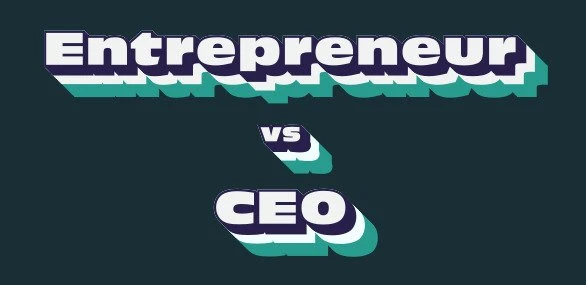 As an entrepreneur, you don’t also have to be a CEO. You can be, but there’s no written-in-stone axiom declaring “Ye who starts a business must also run it.”
As an entrepreneur, you don’t also have to be a CEO. You can be, but there’s no written-in-stone axiom declaring “Ye who starts a business must also run it.”
The reason behind this is simple: Entrepreneurs and CEOs are, on paper, very different.
Entrepreneurs
Entrepreneurs find problems — nay, seek out problems — so that they can come up with solutions for them.
They’re calculated risk-takers, but no one bats .1000. Entrepreneurs fail hard and often, and the best part? It doesn’t stop them from trying again…and again…and again. To them, success is just like problems; always out there, waiting to be found.
Entrepreneurs are visionaries. They see an outcome and the path towards achieving it. Getting others to buy into their vision is easy because entrepreneurs are natural storytellers and masters of charisma.
This doesn’t mean they’re swindling people into believing that XYZ solution will fix XYZ problem. The charisma and bona fide storytelling ability is a byproduct of an entrepreneurs’ passion and commitment. Unfortunately, this only goes so far.
Knowing the path needed in order to find success is not enough. It’s too macro — the devil is in the details. I know that, in order to feed my family, I need to go to the grocery store. But what are we cooking throughout the week? What do we need in order to do so? What happens if something is out of stock?
Therein lies the challenge for entrepreneurs. Most can get the ball to the red zone but lack the skills needed to punch it in for a touchdown.
Which brings us to…
CEOs
Good CEOs are high-achieving, high-caliber individuals who know how to write a business plan, how to run a business, and how to put systems and processes in place that will help a company follow its path to success expecting speed bumps and knowing how to navigate them.
Notice something? CEOs are kind of the exact opposite of entrepreneurs. Or they at least think differently.
Entrepreneurs are sometimes perceived as squirrely and frenetic, blinded constantly by new opportunities. “Look, over there! A new problem! Let’s fix it!” Again, this sort of go-getter mentality is often what helps an entrepreneur succeed, but there’s no hiding its obvious pitfalls.
CEOs, on the other hand, are perceived as forward-thinking tacticians. If an entrepreneur’s vision is an oil painting, then a CEO’s interpretation of the same vision will include gridlines, revenue numbers, and “Phase 1,” “Phase 2,” “Phase 3,” etc.
How to be an entrepreneurial CEO
Remember what I said at the beginning — on paper, entrepreneurs and CEOs are very different. But that doesn’t mean you can’t start your own company and run it. In fact, understanding the on-paper differences between entrepreneurs and CEOs is the first step in becoming an entrepreneurial CEO.
If you’re an entrepreneur with an inkling for CEO-ship, here are a few more things to do:
1. Ask yourself the all-important why
As a current entrepreneurial CEO, I can say with full certainty that I didn’t always think about being a CEO. I started my own business when I was fifteen — a weekend DJ gig — and it was fun to walk around calling myself the ‘CEO,’ but it didn’t click for a long time that it was something I could or wanted to be.
To this day, I still consider myself more of an entrepreneur than CEO, but I’ve also taken steps to develop my skills and put the right people around me (more on this in a few). So what’s your drive? What’s the why behind your thinking? Figure out if being a CEO is something you want to do, or something you think you have to do. If the latter — bring someone in. Your future self (and company) will thank you.
2. Identify your strengths and weaknesses
Part of my evolution from entrepreneur to entrepreneurial CEO involved being transparent with myself about my strengths and weaknesses. If you know what you’re not good at, then it’s easier to compensate by hiring talent who is good at these things.
If you lack competence in something, make up for it in recruiting. “My way or no way” won’t work. Trust me. Early on in your entrepreneurial venture, you might have to wear several hats, but the quicker you can toss a few to others, the better. Identify:
- What you’re good at
- Where you’re lacking
- What you’re good at that you like doing
3. Surround yourself with talented people
Once you know what you want to do and what you need help with, it’s much easier to find that support. Surround yourself with talented people who not only help you succeed, but inspire you to do so.
A strong executive leadership team can create a trickle-down effect across your entire organization. You. Want. This. Find leaders who you can empower to be their best selves, and who will then empower their teams to follow suit.
Taking a business from $0 to $2 million is much different than $2 million to $10 million. Hiring your first 20 employees isn’t the same as growing from 20 to 100. Smart CEOs recognize early on that they can’t do their job without smart, talented people around them.
4. Expect to fail
I write about failure a lot because it’s happened to me a lot. This is where the entrepreneurial mentality comes in. Entrepreneurs know that failure is always lurking around the corner, and that’s okay.
Nothing is perfect, and nothing ever will be. Expecting to fail and fail often is healthy, so long as you learn from your mistakes and challenge yourself and your team to be better.
5. Treat personal development like a religion
Hire to counterbalance your weaknesses, but also never stop improving yourself! My growth has come from personal development. I have an executive coach who I meet with weekly; I’m part of a young professional’s group; I read self-help books that interest me and spend time trying to implement what I learn.
This is entrepreneurship on a personal level. You see a problem (in this case, a weakness) and then find a solution. All this to say — if being an entrepreneurial CEO is what you want, then go get it. Evaluate your why and what you bring to the table, then trust in others to help you along the way.




